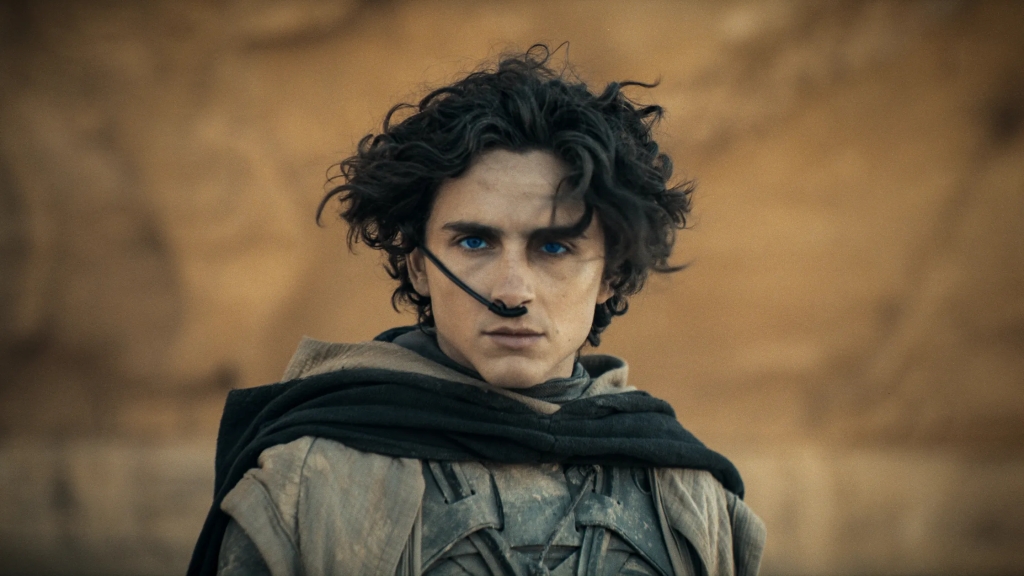The spice must flow…
I read Dune for the first time when I was in high school. At the time, it was merely a trilogy, and the original was just starting to move from cult classic to widely read accepted classic. In the 1970s, the book was noted primarily for its commentary on ecology and the environment. I had never read anything like that. I’d not been into reading science fiction up until that time, and I didn’t really much care for science fiction movies, either; with their incredibly low budgets and amateurish special effects that always took you out of the story no matter how much you were enjoying it. I used to watch Flash Gordon serials, when some of those afternoon kids’ shows that Chicago’s television stations would run them–and while badly produced on a shoestring, the stories themselves were compelling enough to hold my interest, and Buster Crabbe was certainly good-looking enough to keep me interested.
I digress.
But reading Dune turned me into more of a science fiction fan than I had been already. Like I said, I’d never read anything like it, and while my teenaged self primarily was interested in the space opera elements of the story–prince loses everything to mortal enemies, but gets revenge on everyone, defeats the enemies of his family, and rises to become not only the new emperor but messiah of a new religion that takes over the vast reaches of the empire, and the holy war (jihad) of conversion that followed. One of the things I loved about the way Frank Herbert wrote the book was how it bounced around the galaxy, uncovering the mindsets and other conspiracies going on throughout the empire (politics) in what seemed like disconnected stories that all converged in the end and were resolved…while showing the connections that were there all along. I read the other two books in the original trilogy that year–Dune Messiah and Children of Dune–and I always thought the second was perhaps the weakest of the series. I’ve never reread any of the books–I think the series grew to six or seven before Herbert died and his heirs took over; I’ve not read any not-Frank generated Dune novels–other than the first, and I know the last time I reread Dune, I was really taken aback by the writing, which seemed poor. I would like to revisit Dune Messiah at some point because it’s more political than anything else; and also set up the rest of the series while the original remains as the only book of the series that can be read as a stand-alone.

Star Wars was released the summer before my senior year in high school, and it changed special effects, and science fiction films, forever. So when the David Lynch film was released in the early 1980;s, I went into it expecting it to be more than it turned out to be. I had wondered how all the internal monologues would be handled, as well as the entire backstory that was necessary for the film to make sense to people who’ve not read the book. It was a big film, to be sure, but the effects weren’t great–and the choice to hear the internal thoughts as whispers, which meant almost fifty percent of the picture was whispered–weakened it. And really, most of the real action of the story takes place in the second half–and basically the Lynch film condensed the second half of the book to a quick transitional jump, and it wrapped up very quickly. (Having Paul bring rain to Arrakis in the final scene was also a bad choice, which negated everything about Dune’s ecology and the secret of the worms.) But I did like it, if parts (mostly Harkonnens) were over the top. But I was kind of excited to hear Denis Villeneuve was shooting it in two parts. I enjoyed the first part, but the second? Exceptional, and proved that Villeneuve’s vision for the property was the right one.
Dune Part 2 follows the book far more closely than any other adaptation has, which usually seems to run out of steam and time by the time Paul and his mother flee into the desert to seek safety with the Fremen. I also really liked how reluctant Paul was to assume leadership, or to launch his “religion”–because he IS the fulfillment of the Bene Gesserit “prophecy,” which was really just propaganda spread by Sisterhood missionaries centuries, if not millennia, before. He can see the possible futures as well as the entire past, and he knows his holy war will kill millions, if not billions, and he doesn’t want to be responsible for that. Dune Part 2 plays like a galactic Game of Thrones, and I appreciated all the politics on top of the action. I feel like this Villeneuve version of the story is the closest to what Herbert wrote and created. It’s an epic film, shot on an epic scale, with stunning visuals and strong performances–Austin Butler’s Feyd-Rautha makes you forget all about Sting’s bizarre performance in the Lynch version–and I do look forward to the next chapter in this sprawling saga.
Highly recommended.